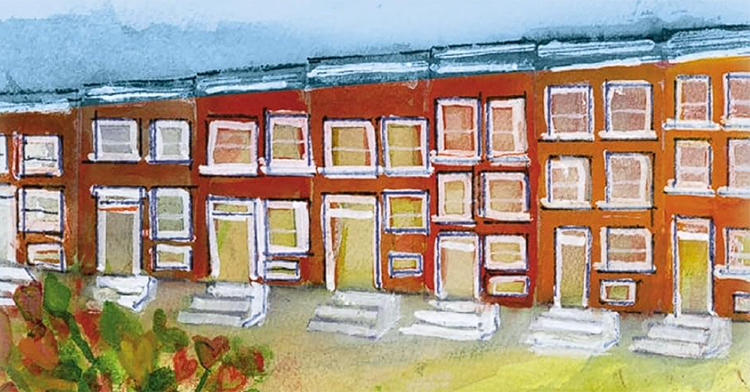In his new book, “Sharing the Crust,” Mark R. Gornik tells the story of his mentor, collaborator and friend Allan Tibbels, who in 1988, with his wife, Susan, founded the New Song Community Church and Christian community in the Sandtown neighborhood of Baltimore. Their approach was based on John Perkins’ principles of Christian community development; Gornik served as pastor of New Song Community Church until 1998, when he moved to New York to help launch a sister church and, eventually, City Seminary of New York.
Tibbels, who had been paralyzed since a 1981 sports accident, died June 3, 2010. The church and its community efforts continue.

In this chapter, Gornik reflects on Tibbels’ experience with the police as a resident of Sandtown and how it shaped him.
Fire
Word travels fast in the neighborhood.
Allan was at the Sandtown Habitat office on Fulton Avenue when word reached him. The building is an arrangement of desks, a basement loading dock, and two floors of warehouse space filled to the brim with construction supplies, kitchen sets, power tools, and hard hats, the logistics base for converting shells of bricks into homes of beauty.
Thousands of people had now come to know this corner of Fulton and Laurens as a place to meet week after week, getting work assignments to build homes in the neighborhood, but also finding a way to ensure that every wall of separation, from walls of the imagination to concrete highways, would begin to crumble. Fulton was a community center, a base of operations for building up the neighborhood.
When word reached him, Allan left immediately, pressing his electric wheelchair forward as fast [as] it would go, aware of every curb cut or not, every crevice of the worn asphalt streets, every house between Fulton and Stricker, a trip taken thousands of times. East two blocks on Laurens Street, past Fox’s Liquor store and Morton’s Funeral Home, and then at the coordinates of the basketball courts and the asphalt lot of Gilmor Elementary, around the corner and up Stricker.

Arriving at the red brick row house on Stricker, he sees the front door is knocked down from a raid, and the police are now out front. Because no one was home. Because it was the wrong house. Because the house that was raided was Allan and Susan’s home.
For over twenty-five years, “Allan and Susan’s” had been a center of community. Jenny and Jessica’s place, daughters now grown. Fitt and Gary, family too. Ky’Asia, of course. Two cats. A place for a meal, an ear to bend, a prayer to offer, a basketball game to review, a Ravens or Orioles win to celebrate. Everyone in the neighborhood knew that. Except the police, it seems.
It isn’t the door that matters. Well, the broken new door does matter, but Orlando and Gary are there and will put it back on. What matters is the sum of indignities, the accruing of injustices, the cosmic wrong of it all for the neighborhood. What matters is what the broken door unmasks.
Allan’s gift of prophetic conscience is a fire in his bones. As the scholar of the Hebrew prophets, Abraham Heschel, explained, it is not just what the prophets said, but God’s passion living through them. As they are in relationship to God, for the prophets there is first the pain, then the anger, the suffering with, followed by the body prophesying. There is a fire in their bones, like in Jeremiah, and now that fire, that passion, is flowing out of Allan. There is a commitment in his life to see differently like Daniel, Amos, Micah, Ezekiel, Isaiah.
Looking at the police, Allan clears his throat and begins to raise his voice, at least as much as he can because the muscles that normally work to expand a person’s lungs are weakened in his body by paralysis.
Later, he wrote the following about the incident:
The head detective was extremely polite and apologetic, said to me, “So what you are saying is that there should be no police force?” I told him there must be legalization of drugs, that in the meantime the residents and police are virtual enemies with the police causing pain and hardship. He asked me if I was advocating for legalization and I told him yes.
No police force? Allan left his answer hanging in the air, but he knew what he thought. He was thinking not just about the police, but about imagining a different way of seeing how communities can and should work. Allan was rejecting justifications for violence, for keeping Sandtown down.
Legalization of drugs? The terms “legalization” and “decriminalization” of drugs are often used interchangeably, but either way, for Allan drugs were a symptom and not the cause of trouble. Instead, the whole situation was a public health crisis, driven by an economy that had written off the neighborhood, by a lack of belonging in our world. Countless lives had been destroyed by addictions, especially to heroin, Baltimore’s historic drug of choice. And as a consequence, nearly Allan’s life too.
Some twenty years earlier, in the same place where Allan and the detective were now talking, two men passing through the neighborhood had forced their way inside the same Stricker Street house. With a large knife taken from the kitchen, they placed it at Allan’s throat. Holding his neck so hard that Allan could hardly breathe, they took Allan around the house in search of cash and valuables. Shaking, they seemed to Allan to be desperate “addicts.” Threatening Allan, they told him they could “kill him in a minute.” He believed them.
As all of this was happening, with the knife still to his neck, Allan said he would pray for them. “Are you a churchman? Are you sure you will?” one of them asked in response. When they were about to leave, Allan told them that he “loved them and would definitely pray for them.” Reflecting afterwards on what had happened, and the myriad of scenarios that could have unfolded, Allan wrote in his journal:
I realized … in praying that Christ was treated harshly and responded in love, and I should do the same. I believe God was working in the guy who asked for prayer, who is hurting so much.
Allan knew that each addiction was a crisis of hope, a crisis that follows from an absence of stable foundations, like health, rest, hope, employment, and means of joy across many Baltimore years. The dealers too, shaking it up on the corners, were exhibiting this lack of hope and of stable foundations, seeing drug dealing as the only alternative in an economy that had long ago collapsed upon them like a falling, vacant building.
In freedom derived from God, from faith shaped by the Scriptures, Allan rejected the necessity of the way things are, from the police state to the prison system. He believed them to be unjust and that therefore there should be no place for them. In this sense, Allan was a prison and police abolitionist, although he didn’t use those terms.
In hope, and in community, and with all he had, Allan had worked to offer an alternative to mass incarceration and the prison system by the witness of the church to the gospel. Everything New Song was trying to do was this alternative, joined by naming how the systems, the powers of death were destroying young lives, families, and the neighborhood. Sandtown, Baltimore, didn’t need more jail cells and an entrenched penal system, but jobs and life-giving ways, and a greater sense of community.
After decades in Sandtown, Allan didn’t see the police, the prisons, the entire system in Baltimore as being reformable. Cosmetic changes would last only for a moment. Without changes that went deep, to the underlying direction of things, without something different in its place, Allan thought (and repeatedly shared with all who would listen), Sandtown, and West Baltimore more broadly, would continue to be “volatile,” a “powder keg” that could detonate at any moment, for too many layers of pain and too many decades of scars had accrued there.
It could happen any time, Allan said, and then it happened, just a few years later. On the morning of April 12, 2015, a young man named Freddie Gray was arrested in the Gilmor Homes just off North Mount Street. Following interaction with police, Gray was left with injuries to his spinal column, and he died a short time later. On the day of his funeral, the city erupted in fury and flames, its pain accumulated over decades and lifetimes turned to protest. The governor placed the National Guard on the streets of Sandtown and across the city.
In freedom derived from God, from faith shaped by the Scriptures, Allan rejected the necessity of the way things are, from the police state to the prison system.

Yes, Allan saw death was everywhere, but its power was defeated on the cross and in the resurrection. Therefore, the answer to the struggles of the neighborhood was seeing Sandtown differently, “regarding no one from a human [worldly] point of view” but instead seeing all “in Christ” (2 Corinthians 5:16, 17). To live in Christ in the neighborhood, in the way of the cross, in the power and hope of the resurrection: this is what mattered to Allan, and how he sought to approach everything.
But on the streets of Sandtown, on that day in front of his house, in the most evangelical of moments, instead of despair and giving up, Allan gave witness to a different way — the way of living with and supporting one another, the way of abounding in tenderness, love, and mercy, of coming to a place of belonging beyond fear, the way of what the biblical writers called true shalom and peace. He sought the way of simple caring, of seeing, hearing, and listening. In a phrase from Dorothy Day, Allan believed in the transformative power of love in community. This is what God wanted for Sandtown, for Baltimore, thought Allan.
Allan placed the events of the day in his journal and then concluded no one would be held accountable for what happened to his door and his house that day. Accountability had never happened before, so why now? The police, wrote Allan, were “part of the oppressive institution currently in place, which I think includes the entire criminal justice system.”
These are the final words Allan would place in his journal.
Used by permission of Wipf and Stock Publishers, www.wipfandstock.com.























